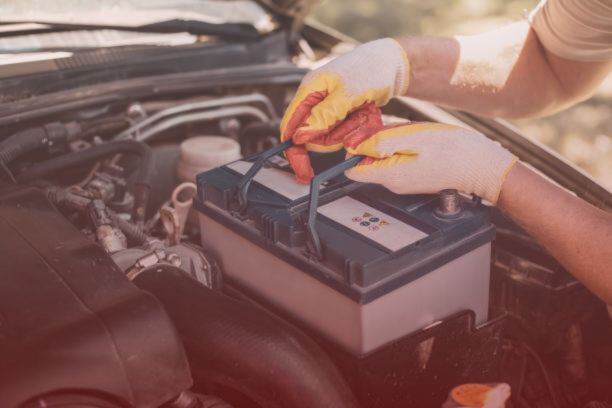Have you ever turned your key, only to hear that frustrating click instead of your engine roaring to life? Your car battery might be the hidden culprit.
Knowing exactly when to replace your car battery can save you from unexpected breakdowns and costly repairs. You’ll discover the clear signs your battery is failing, simple tips to check its health, and the best time to make a change.
Keep reading to avoid getting stranded and keep your car running smoothly.

Credit: www.batteriessunshinecoast.com.au
Signs Your Car Battery Needs Replacement
Knowing when your car battery needs replacement can save you from unexpected breakdowns and costly repairs. Batteries don’t always die without warning; they often show clear signs that they’re struggling. Pay attention to these indicators—they can help you decide if it’s time to get a new battery before you’re left stranded.
Slow Engine Crank
When you turn the key, does your engine take longer than usual to start? A slow engine crank is a common sign that your battery is weakening. This happens because the battery isn’t supplying enough power to the starter motor.
Think about the last time your car hesitated before starting. That delay often signals the battery is losing its ability to hold a charge.
Dim Headlights
Have you noticed your headlights looking dimmer, especially when the engine is off? Dimming lights often mean the battery is not delivering consistent power. This is particularly noticeable during early mornings or late nights when you rely on your lights the most.
If your headlights brighten up once the engine is running, it could be a sign the battery is weak but the alternator is still working.
Electrical Issues
Strange behavior from your car’s electrical components, like power windows, dashboard lights, or radio, can point to a dying battery. These systems rely on steady power to function properly. Flickering or slow responses suggest your battery is struggling.
Have you experienced your car’s electronics acting up unexpectedly? That’s a red flag worth checking.
Check Engine Light
Sometimes, the check engine light illuminates because of battery problems. Modern cars monitor battery voltage and performance closely. A weak or failing battery can trigger this warning, alerting you to potential issues.
Don’t ignore the check engine light if it comes on alongside other battery-related symptoms.
Swollen Battery Case
Physical changes in your battery, like a swollen or bloated case, indicate internal damage. Heat and overcharging can cause the battery’s casing to expand, which is dangerous. This sign means the battery must be replaced immediately to avoid leaks or explosions.
Have you ever opened your hood and noticed a battery looking different from usual? That’s a clear call for action.
Old Age
Batteries have a limited lifespan, usually between three to five years. Even if your battery seems fine, age alone can reduce its efficiency. If your battery is nearing or past this age range, it’s wise to test it regularly and prepare for replacement.
Do you know how old your battery is? Keeping track can prevent surprises down the road.
Factors Affecting Battery Lifespan
Several factors influence how long a car battery will last. Understanding these can help predict when to replace your battery. The battery’s lifespan depends on the environment, how you drive, the battery’s quality, and your vehicle type.
Climate Impact
Hot weather can shorten a battery’s life by causing fluid evaporation. Cold weather makes it harder for the battery to start the engine. Extreme temperatures stress the battery and reduce its efficiency. Areas with mild climates often see longer battery lifespans.
Driving Habits
Short trips do not fully recharge the battery. Frequent stops and starts drain battery power faster. Long drives allow the battery to recharge completely. Keeping electrical devices on when the engine is off also drains the battery quickly.
Battery Quality
Higher quality batteries tend to last longer and perform better. Cheaper batteries may fail sooner, especially under stress. Quality depends on brand, manufacturing, and materials used. Always choose a battery suited for your car and climate.
Vehicle Type
Smaller cars usually have smaller batteries with shorter lifespans. Larger vehicles often use bigger batteries that last longer. Electric and hybrid cars have different battery systems that affect life expectancy. Heavy-duty vehicles may require batteries with more durability.
When To Test Your Car Battery
Car batteries usually last 3 to 5 years before needing replacement. Testing helps spot weak batteries early to avoid sudden failure. Watch for slow engine starts or dim lights as signs to check your battery.
Testing your car battery regularly is crucial to avoid unexpected breakdowns. A car battery may seem fine today but could fail tomorrow, leaving you stranded. Knowing when to test it can save you time, money, and frustration.Regular Maintenance Schedule
Integrate battery testing into your regular car maintenance routine. Doing so can prevent small issues from becoming big problems. Most experts recommend testing your battery every six months to ensure it’s functioning properly.Before Long Trips
Planning a long road trip? Testing your car battery should be on your checklist. A quick test can give you peace of mind, knowing your battery won’t leave you stuck in unfamiliar places.After Extreme Weather
Extreme weather conditions can take a toll on your car battery. Whether it’s a blistering summer or a freezing winter, test your battery afterward to assess its health. A simple test can reveal if the battery has been compromised, preventing future inconveniences. Regular testing of your car battery can help you avoid those dreaded moments when your car won’t start. You wouldn’t want to experience that on a cold winter morning or during a road trip. Keep an eye on your battery health, and you’ll keep your car running smoothly.How To Test Battery Health
Knowing how to test your car battery’s health helps avoid unexpected breakdowns. Regular checks reveal signs of weakness early. Testing is simple and requires basic tools or professional help. Here are easy ways to check your battery’s condition at home and with experts.
Using A Multimeter
A multimeter measures your battery’s voltage quickly. Set it to DC voltage mode. Connect the red probe to the positive terminal and the black to the negative. A healthy battery shows about 12.6 volts when the engine is off.
If the reading drops below 12.4 volts, the battery may be weak. Below 12 volts means the battery is likely discharged or failing. This test gives a quick snapshot of battery health.
Load Testing
Load testing checks how the battery performs under pressure. You can use a battery load tester for this. It applies a load similar to starting the engine. Watch the voltage during the test.
A healthy battery voltage stays above 9.6 volts for 15 seconds under load. If it drops more, the battery struggles to hold power. This test shows if the battery can supply power when needed most.
Professional Battery Testing
Auto shops offer advanced battery testing services. They use machines that check battery charge, capacity, and overall health. These tests are very accurate and give detailed results.
Professionals also check the car’s charging system to find related problems. This service helps decide if you need a new battery or just a recharge. It’s a reliable option for peace of mind.
Timing For Battery Replacement
Knowing the right time to replace your car battery can save you from unexpected breakdowns and costly repairs. Timing affects not only your car’s reliability but also your peace of mind on the road. Let’s break down the key factors that help you decide when to make the switch.
Average Battery Lifespan
Most car batteries last between three to five years under normal driving conditions. However, this range can vary depending on your climate, driving habits, and the quality of the battery itself.
Hotter climates tend to shorten battery life, while frequent short trips can prevent your battery from fully charging. Have you checked how old your battery is? If it’s approaching the three-year mark, it’s time to start paying closer attention.
Replacing Proactively
Waiting for your battery to die on you can leave you stranded at the worst possible moment. Proactive replacement means changing your battery before it fails completely, based on its age and performance.
Look for signs like slow engine cranking, dim headlights, or dashboard warning lights. These symptoms often show up before total failure. Have you ever been stuck in a parking lot because your battery gave out? Avoid that hassle by replacing early.
Waiting For Failure Risks
Some drivers wait until the battery completely dies before replacing it, but this approach carries risks. A sudden failure can happen at inconvenient times, such as during bad weather or late at night.
Besides the inconvenience, waiting too long can stress other electrical components, increasing repair costs. Ask yourself: Is the risk worth it when a new battery can restore confidence and reliability?

Credit: jrygautopartsmotolite.com
Tips For Extending Battery Life
Extending your car battery’s life saves money and avoids unexpected breakdowns. Simple care habits make a big difference. Follow these tips to keep your battery healthy and working longer.
Keep Terminals Clean
Dirty battery terminals cause poor connections and reduce power. Check terminals regularly for dirt or corrosion. Use a mixture of baking soda and water to clean them gently. Dry the terminals well before reconnecting. Clean terminals improve battery performance and prevent starting problems.
Avoid Short Trips
Short trips do not give the battery enough time to recharge. The engine needs to run for at least 20 minutes to restore battery power. Frequent short drives drain the battery quickly. Try to combine errands or take longer drives to keep the battery charged.
Limit Electrical Use When Idle
Using electrical devices while the engine is off drains the battery fast. Avoid running the radio, lights, or air conditioning without the engine running. Turn off all electrical components before leaving the car. This reduces battery drain and helps maintain charge.
Store Properly During Inactivity
When not using your car for weeks, store the battery correctly. Disconnect the battery to stop any power drain. Keep the battery in a cool, dry place away from direct sunlight. Use a trickle charger if possible to maintain a steady charge. Proper storage prevents battery damage and extends life.

Credit: www.riversidegmsuperstore.com
Frequently Asked Questions
How Long Does A Car Battery Usually Last?
Car batteries typically last between 3 to 5 years. Factors like climate, driving habits, and maintenance affect lifespan. Regular checks help detect early signs of failure, ensuring timely replacement and preventing unexpected breakdowns.
What Are The Signs Of A Failing Car Battery?
Common signs include slow engine crank, dim lights, and electrical issues. A swollen battery case or corrosion on terminals also indicates problems. Prompt battery testing can confirm if replacement is needed to avoid vehicle starting failures.
Can Extreme Weather Affect Car Battery Life?
Yes, extreme heat and cold significantly reduce battery performance and lifespan. Heat accelerates fluid evaporation, while cold reduces battery capacity. Protecting the battery from harsh conditions and regular maintenance helps extend its durability.
How Often Should I Test My Car Battery?
Testing every 6 to 12 months is recommended, especially after two years of use. Regular tests detect voltage and cold cranking amps, preventing unexpected failures. Professional battery tests ensure your vehicle remains reliable year-round.
Conclusion
Car batteries don’t last forever. Watch for signs like slow engine starts or dim lights. Regular checks help avoid sudden breakdowns. Replace your battery every three to five years. Cold weather or frequent short trips can shorten battery life. Keep your car running smoothly with timely battery care.
Don’t wait for your car to fail. Act early to save time and money. A healthy battery means a reliable car. Simple steps keep you safe on the road.

